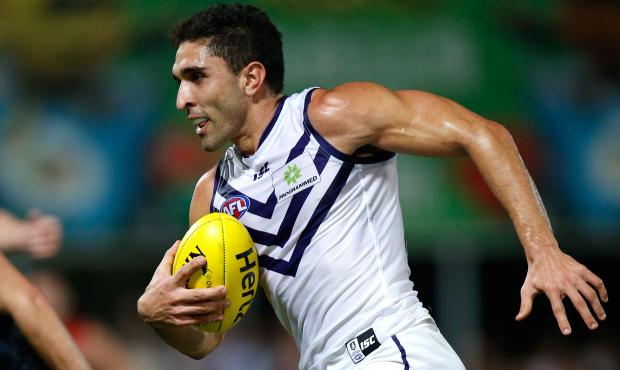FORMER Geelong key position prospect Marc Woolnough could empathise with both Fremantle's Anthony Morabito and the Western Bulldogs' Tom Williams when the duo hit the headlines last week.
Woolnough took 1421 days to move his games tally from two to three, when he made his comeback from two knee reconstructions at the MCG against Hawthorn in 2002.
And it was Western Bulldogs coach Brendan McCartney, then working as an assistant at Geelong, who had the courage to tell Woolnough his playing days were over.
"I had to accept at one stage I wasn't going to get back to being the player the club needed me to be," Woolnough told AFL.com.au.
The father-son selection first did his knee in 1999 in a practice match at the Gold Coast, then 10 minutes into his comeback game in 2000 during the third quarter of a reserves game against Collingwood.
His goal during his rehabilitation was to play one game.
Woolnough had kept his goal realistic because his surgeon had been pretty direct in his advice. The surgeon told Woolnough it was difficult to see him getting back and, if he did, he would not last long.
Geelong CEO Brian Cook, who remains with the Cats, stuck with Woolnough.
He explained to the youngster - who in 2002 wore the same No.10 at Geelong as his father Michael had - his rationale: Woolnough's values aligned with where the club was heading.
That big commitment from Geelong was rewarded when Woolnough returned against Hawthorn at the MCG alongside the likes of Gary Ablett, Joel Corey, Jimmy Bartel and Steve Johnson.
Woolnough remembers the game like it happened yesterday.
His coach, Mark Thompson, didn't say much because, Woolnough suspects, he wanted to alleviate any pressure the then 22-year-old might have been feeling.
But the support was clear as he "tried to enjoy every moment representing the club you grew up barracking for and wearing your dad's number."
Not only does he remember the immense support he received from teammates but he believes they may have got some benefit out of his journey too.
"[I think] they felt a sense of pride to be able to support and play a role as well. It was a good achievement personally, but I think the boys got a bit of mileage out of it," Woolnough said.
He managed three more senior games but was again battling injuries soon after.
He remembers going to McCartney after what would be his final game to tee up a time to review his video.
McCartney said 'let's got to the pub instead'.
Over a drink on a Monday night, the assistant coach told Woolnough it was beyond him to make it back.
"He was concerned for my wellbeing. I was at about 15 to 20 per cent of what I was capable of [playing]," Woolnough said.
He doesn't know whether McCartney had the same chat with Williams or not but Woolnough has positive memories of that time in football.
"I decided just to focus on the fact that I was an employee of the football club and with that comes an obligation to have a positive influence on the group," Woolnough said.
"I needed to earn the money I was paid by the football club even though I wasn't playing on the field, so I just focused on that and then I would get back when I could. That gave me enough focus and kept me interested."
"[It's] a terrific achievement to be able to come back after three knee reconstructions," Woolnough said.
"From what I understand, he is really gifted player and he has the physique to be able to withstand multiple reconstructions."
Anthony Morabito powers away with the ball in his comeback game against the Dees. Picture: AFL Media
It must be said the 22-year-old Docker’s comeback gave hope to all who have endured knee reconstructions.
And it also showed what a good organisation Fremantle has become in sticking with and supporting Morabito to fulfil his potential.
Woolnough, who now works for Lion Co. in Queensland, watches players on the comeback trail with special interest.
He knows every circumstance is different and that while it is tough, the effort is worthwhile.
Because when a person such as McCartney – who Woolnough says was like a father-figure to him during his playing days – says enough is enough, no what-if questions remain.
BREAKOUT: Days between games
Longest break between games since WW2:
2884 days - Chris Aitken, Melbourne 1969, 1977
Memorable layoffs:
1372 days - Neale Daniher Essendon 1981, 1985
1394 days - Anthony Morabito Fremantle 2010, 2014
1421 days - Marc Woolnough Geelong 1998-2002
Days since Daniel Menzel played seniors for Geelong:
1037



